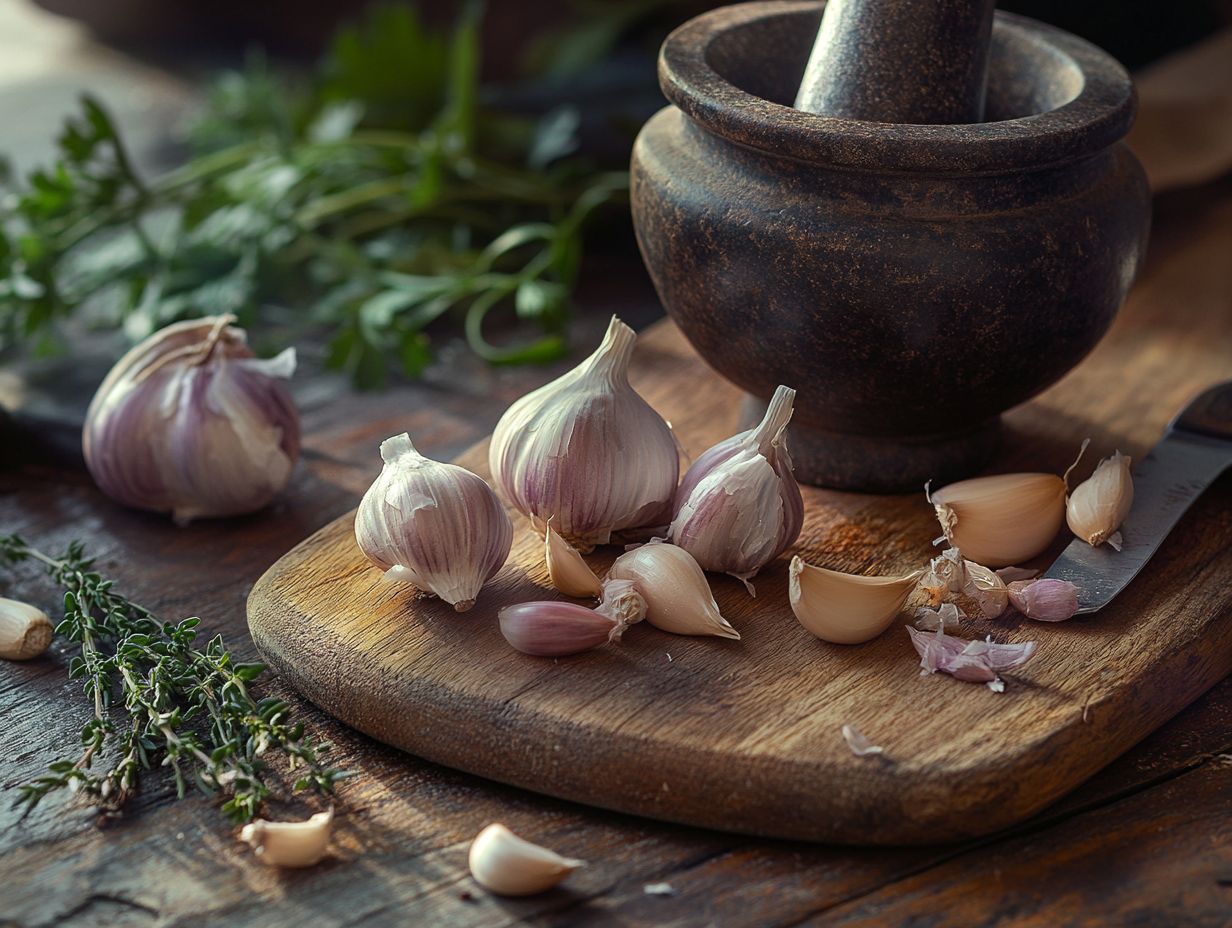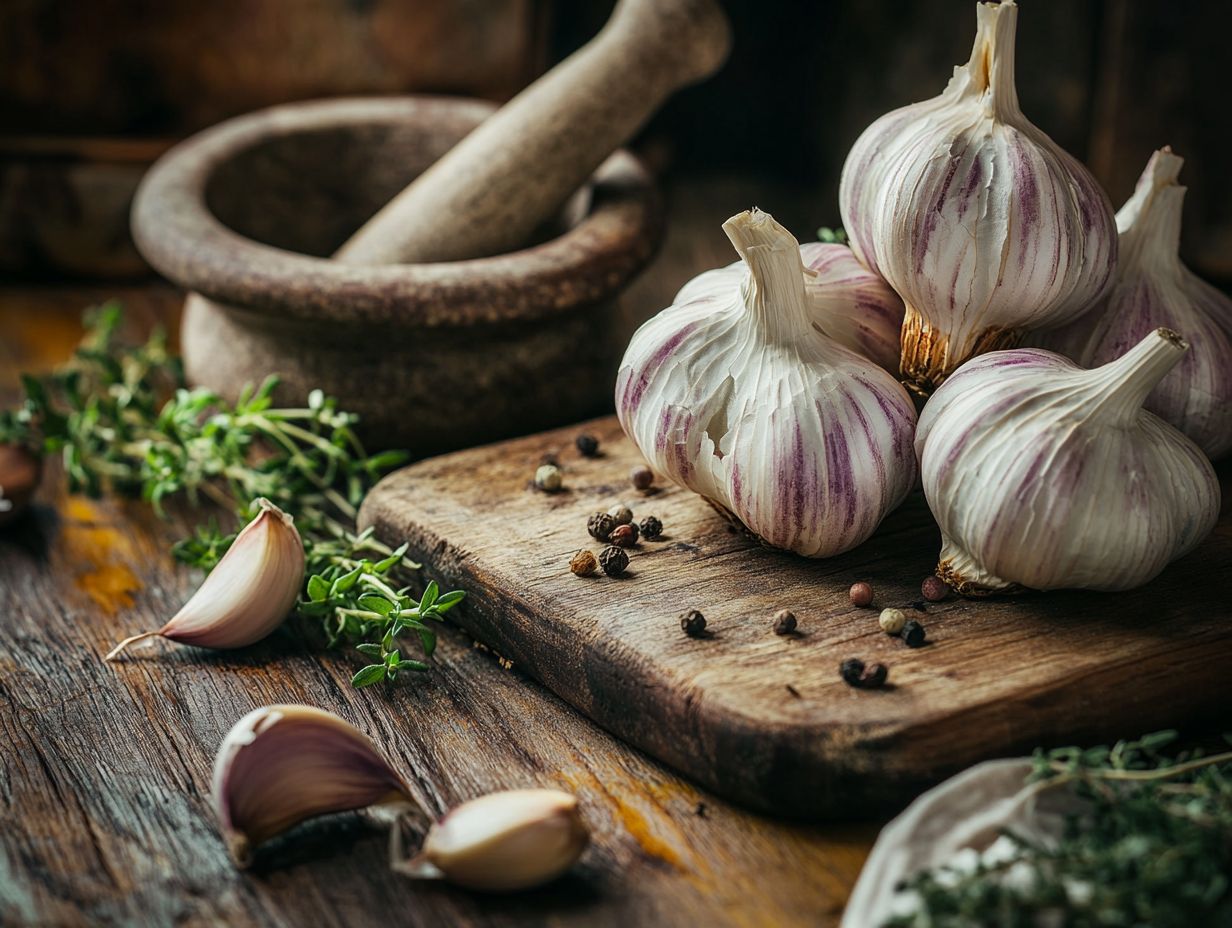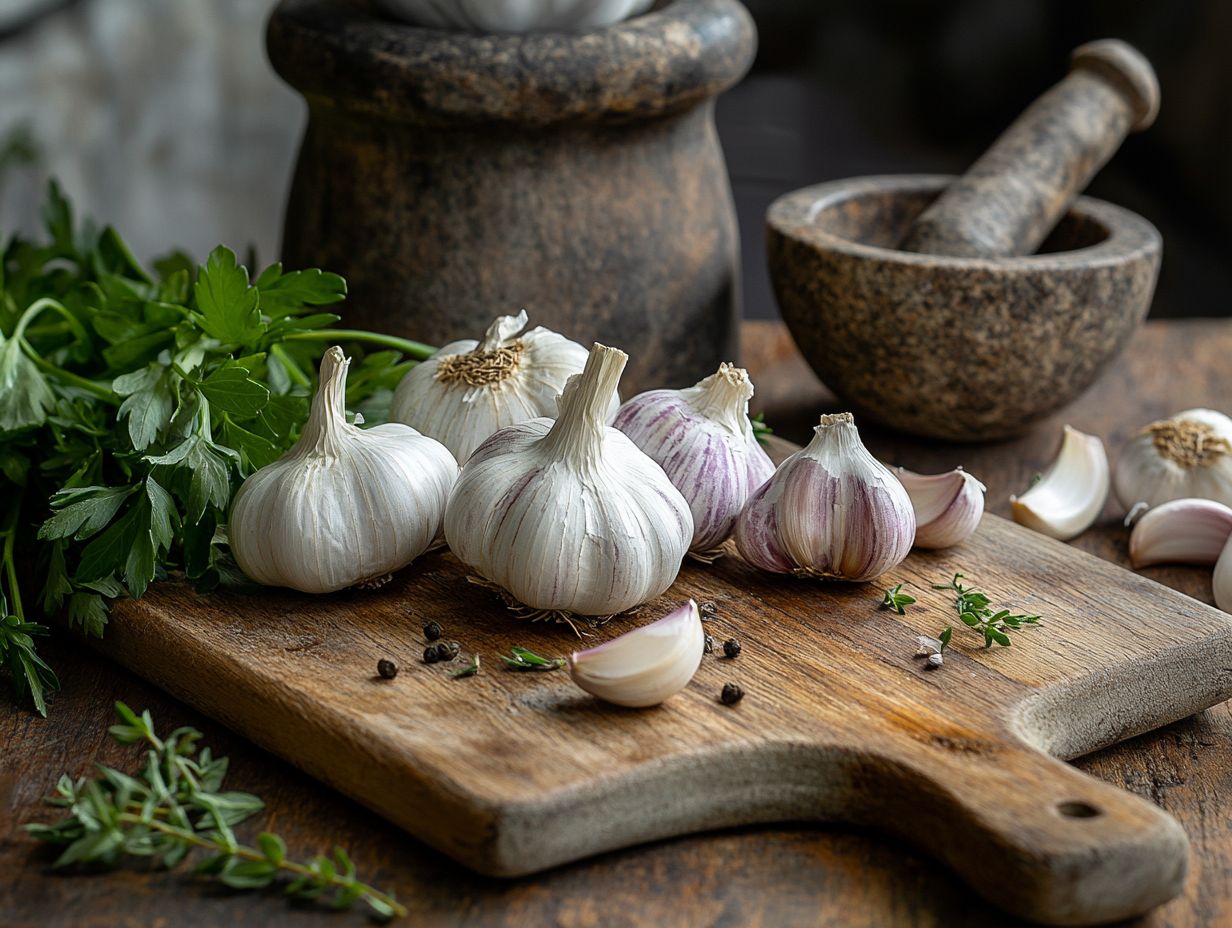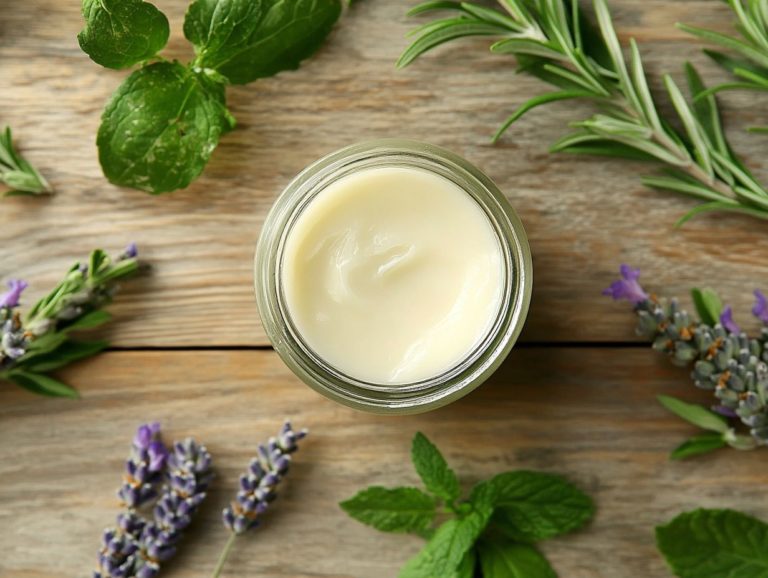The Role of Garlic in Natural Medicine
Garlic, renowned for its robust flavor, boasts a fascinating history as a potent natural remedy.
In this exploration, you’re about to uncover the incredible journey of garlic from ancient kitchens to contemporary medicine, shedding light on its active compounds, such as allicin, and their impressive health benefits.
You ll learn how garlic can boost cardiovascular health and fight infections, along with practical tips for safely incorporating it into your diet.
Important precautions will also be discussed, ensuring you can enjoy all the benefits without any drawbacks.
Get ready to discover the amazing benefits of this extraordinary ingredient!
Contents
- Key Takeaways:
- Active Compounds in Garlic
- Health Benefits of Garlic
- How to Incorporate Garlic into Your Diet
- Precautions and Potential Side Effects
- Frequently Asked Questions
- What is the role of garlic in natural medicine?
- How does garlic work in natural medicine?
- Can garlic help with colds and flu?
- Is there any scientific evidence to support the use of garlic in natural medicine?
- Are there any risks or side effects associated with using garlic in natural medicine?
- How can garlic be used in natural medicine?
Key Takeaways:

- Garlic has been used in traditional medicine for centuries due to its potent health benefits.
- The active compounds in garlic, such as allicin, have germ-fighting and anti-inflammatory properties that can boost your health.
- Incorporating garlic into your diet through cooking or supplements can help improve cardiovascular health and prevent potential side effects when used in moderation.
History and Traditional Uses
Garlic boasts a rich history that stretches back thousands of years, with its traditional uses woven into the fabric of various cultures and civilizations. You might know it as a flavorful cooking ingredient, but it’s also been a cornerstone of traditional medicine, celebrated for its health benefits throughout the ages.
Ancient Egyptians relied on garlic to bolster strength and endurance. Traditional Chinese medicine recognized it as a potent remedy for a host of ailments, from infections to digestive troubles. As time has progressed, the therapeutic applications of garlic have expanded, linking it to the prevention of chronic diseases like cardiovascular issues and disorders related to oxidative stress.
The ancient Greeks even recognized garlic s healing properties, with Hippocrates himself advocating its use for respiratory conditions. In India, garlic is revered in Ayurvedic practices, promoting balance within the body. As this remarkable bulb journeyed from ancient cultures to modern kitchens, it evolved into a culinary staple, enhancing dishes across the globe.
Today, it’s a favorite topic among health enthusiasts who often cite garlic as a natural supplement, praising its ability to support immune function and lower cholesterol. This timeless bulb continues to captivate those intrigued by holistic health, demonstrating its lasting importance in both tradition and modern wellness.
Active Compounds in Garlic
The active compounds in garlic, including allicin, sulfur compounds, and S-allyl cysteine, are the driving forces behind its celebrated health benefits. These compounds bestow garlic with remarkable germ-fighting and antioxidant properties.
Allicin, in particular, is unleashed when garlic is crushed or chopped, giving it that unmistakable aroma and impressive biological activity. This powerful compound is key to garlic s health benefits, linking ancient remedies to today s health practices.
Allicin and Other Beneficial Substances
Allicin stands out as one of the most extensively studied beneficial substances in garlic, renowned for its remarkable germ-fighting properties and its significant role in bolstering your immune system. When you crush garlic, allicin is produced, and its potent effects contribute to its antioxidant prowess, making it a vital compound in the prevention and treatment of chronic diseases.
- Allicin can help lower blood pressure.
- It can reduce cholesterol levels.
- Allicin may fight off certain types of bacteria and viruses.
Research suggests that regular garlic consumption can noticeably decrease the risk of cardiovascular diseases.
Plus, along with allicin, garlic boasts other sulfur compounds, such as diallyl sulfide and S-allyl cysteine, which are also recognized for their impressive health benefits, including anti-inflammatory and immune-boosting effects.
This synergistic combination of compounds in garlic not only supports your overall well-being but also underscores the advantages of incorporating this versatile bulb into your diet for maintaining optimal health.
Explore garlic’s remarkable benefits in your cooking and health routines!
Health Benefits of Garlic
Garlic offers impressive health benefits, particularly for heart health, cholesterol management, and immune function. Adding garlic to your diet may lead to lower blood pressure and a reduced risk of heart disease.
This makes garlic not just a tasty addition to meals but an important ally for long-term wellness.
Antimicrobial and Anti-inflammatory Properties

Garlic is an extraordinary powerhouse of natural healing, brimming with strong antimicrobial properties that can help fight infections and support your immune system. It also reduces inflammation in the body, aiding in the management of various inflammatory disorders.
Numerous studies have underscored garlic s prowess in combating a range of bacteria, viruses, and fungi, solidifying its reputation as a natural antibiotic. For example, research has revealed that compounds like allicin formed when you crush garlic exhibit noteworthy antimicrobial activity against troublesome pathogens such as E. coli and Staphylococcus aureus.
Traditional medicine has long revered garlic for its immune-boosting qualities, often recommending it to ease symptoms of respiratory infections and chronic conditions like arthritis. The synergy of its antimicrobial action and its capacity to modulate inflammatory responses positions garlic as a true powerhouse in promoting your overall health and wellness.
Cardiovascular Health Benefits
Garlic can also lower cholesterol levels, reduce blood pressure, and may help prevent heart disease. Research indicates that regularly incorporating garlic into your diet can positively impact heart health by tackling high cholesterol and supporting overall vascular function.
Numerous studies have shown that aged garlic extract can significantly reduce total and LDL cholesterol while simultaneously increasing HDL cholesterol, effectively enhancing your lipid profile. A meta-analysis further emphasized that garlic supplementation can lower both systolic and diastolic blood pressure, offering a natural alternative for those managing hypertension.
The presence of key compounds, such as allicin, is thought to improve endothelial function and, in turn, bolster vascular health. By making garlic a regular feature in your daily diet, you could potentially diminish your risk of developing atherosclerosis and related cardiovascular issues, painting an encouraging picture for heart health enthusiasts.
How to Incorporate Garlic into Your Diet
Incorporating garlic into your diet is a simple yet versatile endeavor, presenting a multitude of culinary applications as a cooking ingredient, dietary supplement, or health-enhancing addition.
Whether you choose to use fresh garlic cloves, garlic powder, or garlic oil, you ll discover countless ways to savor its unique flavor while reaping an impressive array of health benefits.
Get creative and start enjoying the delicious taste and health benefits of garlic today!
Cooking with Garlic
Cooking with garlic can elevate the flavor of your dishes. It also delivers health benefits due to its active compounds.
Whether you use fresh garlic cloves, roasted garlic, or infused garlic oil, incorporating this aromatic ingredient into your meals significantly enhances both taste and nutrition.
As you explore different cooking techniques, you’ll discover just how versatile garlic can be. For instance, raw garlic adds a punchy kick in salads or dressings.
Saut ing it transforms its bite into a sweeter, mellower flavor, making it perfect for stir-fries or pasta sauces. Roasting garlic takes it to another level, turning it into a creamy, spreadable delight that’s ideal for slathering on crusty bread or enriching soups.
In Mediterranean cuisines, garlic shines in dishes like garlic shrimp or aioli. Asian cuisine often showcases garlic in stir-fried vegetables.
Just remember that high heat can diminish some of garlic’s beneficial compounds. Moderating your cooking temperature can help maintain its health properties.
For a simple yet delicious recipe, consider drizzling garlic-infused olive oil over grilled vegetables or mashing roasted garlic into potatoes for an irresistible side dish.
Supplements and Dosage Recommendations
For those who prefer a concentrated approach, garlic supplements, such as garlic extract and aged garlic extract, are practical alternatives to traditional culinary use.
It’s crucial to understand the proper dosage recommendations to maximize health benefits while minimizing potential side effects.
You can also find garlic oil capsules and powdered garlic supplements, each with different preparation methods that can influence potency and absorption rates.
When choosing a supplement, consider factors like how the garlic is processed, dosage concentration, and your individual health needs.
- Aged garlic extract: 600-1200 mg daily
- Other forms may have different recommendations.
Before starting any supplementation journey, consult with healthcare professionals, especially if you have existing health conditions or take medications. This ensures safety and effectiveness in your health regimen.
Precautions and Potential Side Effects

While garlic is lauded for its myriad health benefits, you must also consider the potential health risks and side effects that could arise, especially if consumed in large quantities or combined with specific medications.
Understanding how garlic interacts with your medications and ensuring its safe usage are critical steps to fully harnessing the advantages of this potent ingredient.
Interactions with Medications
Garlic can interact with certain medications, particularly blood thinners. Be aware of potential health risks before adding garlic supplements or large amounts of garlic to your diet.
Some medications, like warfarin and aspirin, can have their effectiveness altered when combined with garlic, increasing the risk of bleeding.
If you re on diabetes medications like insulin or sulfonylureas, proceed with caution. Garlic may amplify the effects of these drugs, possibly leading to dangerously low blood sugar levels.
You must consult with your healthcare provider before consuming garlic in significant quantities or forms, especially if you re on these specific medication regimens. This approach ensures both your safety and optimal management of health conditions.
Start cooking with garlic today for a flavorful and healthy twist in your meals!
Safe Usage for Pregnant and Breastfeeding Women
For pregnant and breastfeeding women, adding garlic to your diet can offer valuable health benefits. However, be mindful of your consumption to avoid potential risks. Understanding the right way to include garlic during these pivotal times is essential for both your health and your baby’s.
Garlic is well-known for its medicinal properties, packed with compounds that can enhance your immune system, reduce inflammation, and promote cardiovascular health. However, consuming it in excess can lead to gastrointestinal discomfort or interfere with certain medications. Therefore, moderation is key.
You should aim to add garlic to a well-balanced diet, preferably in its cooked form rather than raw, to help minimize any possible adverse effects. It’s important to consult with your healthcare provider before making any significant dietary changes, ensuring that your choices align perfectly with your unique health profile and nutritional needs.
Frequently Asked Questions
-
What is the role of garlic in natural medicine?
Garlic has been used as a natural medicine for thousands of years and is believed to have numerous health benefits. It has been used to treat and prevent various ailments, including high blood pressure, high cholesterol, and infections.
-
How does garlic work in natural medicine?
Garlic contains a compound called allicin, a healthy compound found in garlic, which has anti-inflammatory, antioxidant, and anti-microbial properties. This compound is responsible for many of garlic’s health benefits and is what makes it effective in natural medicine.
-
Can garlic help with colds and flu?
Yes, garlic is often used as a natural remedy for colds and flu. It has antibacterial and antiviral properties that can help boost the immune system and fight off infections. Some research has also shown that garlic may reduce the severity of symptoms and shorten the duration of a cold or flu.
-
Is there any scientific evidence to support the use of garlic in natural medicine?
While more research is needed, there have been numerous studies on the health benefits of garlic in natural medicine. Some studies have shown that garlic can help lower cholesterol and blood pressure and may have anti-cancer effects. However, it is vital to consult with a healthcare provider before using garlic as a natural remedy.
-
Are there any risks or side effects associated with using garlic in natural medicine?
Garlic is generally safe for most people when consumed in small amounts as food or supplements. However, some people may experience side effects such as bloating, gas, or heartburn. Garlic may also interact with certain medications, so it’s important to speak with a healthcare provider before using it as a natural remedy.
-
How can garlic be used in natural medicine?
Garlic can be consumed raw, cooked, or in supplement form for medicinal purposes. It can also be used topically as a natural remedy for skin conditions like acne or fungal infections. Garlic can be added to food or taken as a supplement, but it’s important to follow recommended dosages and consult with a healthcare provider if using it for medicinal purposes.
Make sure to consult your healthcare provider before trying garlic as a remedy!







